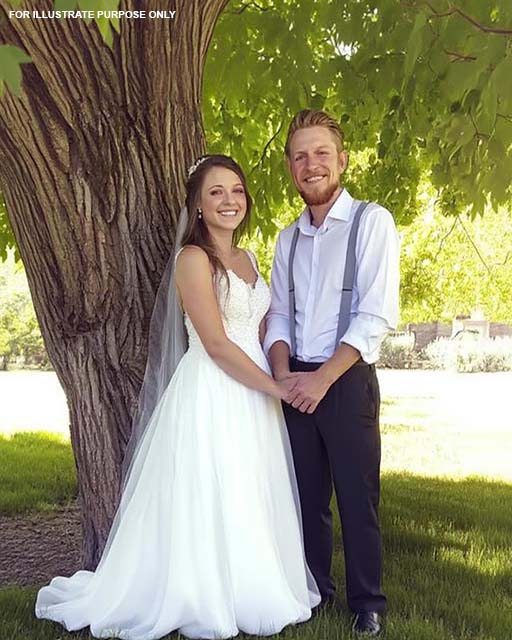Julia’s parents cruelly forced her to chose love or acceptance when she fell in love with a lowly instructor. Our chairs were vacant for her wedding, but her granddad stood proudly at her side. Ten years later, at his burial, they returned to her life with an objective, not to reconcile.
My parents often joked about our future in our stylish suburban house.
“One day, Julia,” my father said, adjusting his tie, “we’ll live in a house so big, we’ll need golf carts to get around.”
My mother would say, “And you’ll marry someone who’ll help us get there, won’t you, darling?” with brittle, exquisite laughter.
“As long as he has a castle and crown!” I replied, smiling like a kid.
Their jokes used to amuse me. A little whimsical. As I got older, I learned their fantasies were about prestige, not fairy tales.
Every action they made in high school was a planned drive for social status. Mom rated my pals by last names and fancy brands. I was chastised for asking my lab companion Lila over to study.
“Are you not getting close to her?” She neatly sliced her steak to invite supper.
I shrugged. She’s clever. A project is underway.”
“She looks like she shops at thrift stores,” Mom sniffed. “Not someone we need around.”
Dad was awful too. Even as the lead, Dad never saw me in a school play. He constantly networked in the lobby with parents who might “help us move up.”
By college, I was acclimated to their steely desire. I met Noah.
“A teacher?” My mother practically spat out her wine when I mentioned him. Julia, love, you can do better.”
I understood her meaning and didn’t care.
I was initially seen by Noah. He ignored fancy shoes and trust monies. He wanted to transform lives and made me feel important—not because of others’ accomplishments, but because of myself.
He proposed in the communal garden where we first met with his grandmother’s old ring. Two of us beneath the stars, no expensive restaurant or huge spectacle.
He shakily answered, “I can’t promise you luxury.” “But I can promise a life full of love.”
I agreed before he finished.
After telling my parents, the backlash was instantaneous.
“Definitely not!” Dad growled. “Man with teacher’s salary? Throwing away your life.”
“He’ll never be able to provide what we gave you,” Mom said coldly. You’ll be alone if you marry him. Unsupported. No inheritance.”
I was stunned. “Really forcing me to choose?”
“It’s him or us,” Dad stated calmly.
So I picked. I sent them a wedding invitation out of politeness, knowing they wouldn’t go.
They didn’t.
My Grandpa Harold did.
A steady, proud man led me down the aisle. I vividly remember his comments as he gripped my arm: “You picked the right kind of rich, kiddo. Love never deteriorates.”
We began life in a modest apartment with creaking pipes and 2 a.m. loud music from neighbors. We laughed it up. The birth of our daughter Mia filled us with delight.
Grandpa frequently came. In hard times, he delivered food, told tales, and taught Mia chess and constellations.
“You know real wealth?” I heard him say. It’s love you don’t earn.”
His death crushed our hearts. I was shaking at his funeral podium.
Then I saw my folks. They approached with practiced grief.
“Julia,” Mom said, grasping my hand, “we were wrong. Please correct things.”
Hope flickered in my chest.
Aunt Marianne took me aside.
She grimaced, “Don’t believe a word of it. “Your grandfather’s will… If they don’t reconcile, education charity get their inheritance. They’re here because of that.”
Like being smacked. Even amid mourning, they sought money.
My pulse raced as I returned to the microphone.
“My grandfather taught me that wealth isn’t in bank accounts or real estate portfolios,” I said. “A partner who makes you laugh when you cry. A youngster who cuddles you while you’re tiny. It comes from unconditional love, compassion, and loyalty.”
I faced my parents. “Some never get that. However, my granddad did.”
Later, the lawyer verified Grandpa gave me a separate legacy. Enough to educate Mia and give us some breathing space.
My parents got nothing.
Every penny they anticipated went to programs for impoverished youngsters, whom they used to mock.
I felt calm beyond money that night on the sofa with Noah and Mia, popcorn on our laps and blankets over our shoulders.
“Mom,” Mia said, “Can you tell me another story about Great-Grandpa Harold?”
I smiled and stroked her hair. I agree, dear. Let me describe the day he showed me genuine wealth.”
